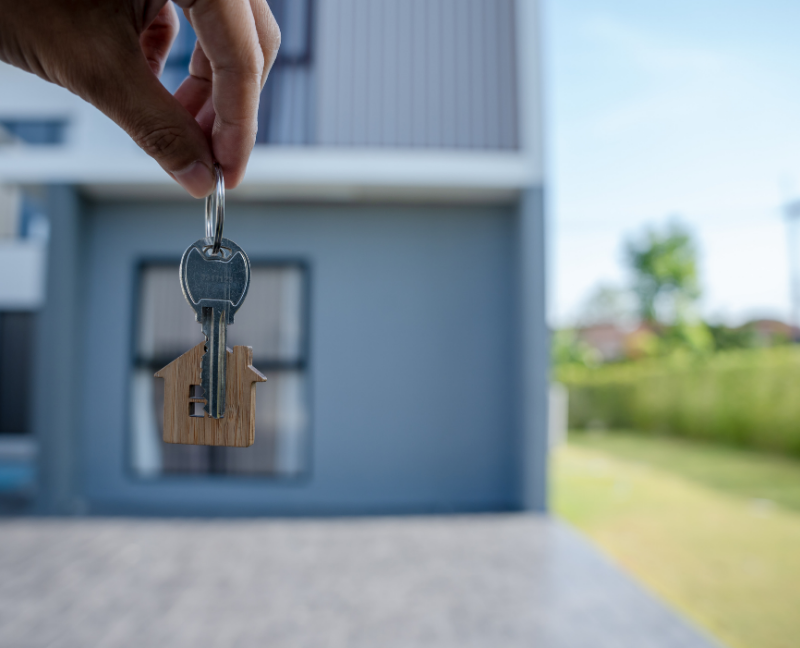Buying your home is thrilling and overwhelming at the same time, especially if you've never done this before. You might be working hard to save money for your down payment while your partner might be searching for ways to improve and renovate it as you both like.
Wherever you are in your planning, you must know that there are many things to consider as you set this path. Other than knowing how much deposit to save, you also have to check neighborhoods, shop different loan options, learn the art of negotiating, and many more. However, buying your first home should not always be terrifying. With the right guidance from real estate experts, you can make the entire process memorable and stress-free.
Taking The First Step
Taking the first step is the easiest and the hardest at the same time because this is knowing how much money to save for the property you want to buy.
How much the down payment will be and how long it will take to save depends on several things, such as:
Saving up thousands of dollars can seem intimidating, but you don’t have to starve yourself or forget your obligations just so you can save up. With the right budgeting skills and a couple of strategies, such as finding an additional source of income, you can do this.
It’s important to know what your target deposit will be.
How will you know, you ask?
You may start by searching the areas you want to buy the property to get an idea of how much down payment you'll need. It is also a good idea to look for recent sale prices of homes similar to the real estate in Indiana you want to buy to have an estimate. Check the average year-on-year percentage price increase. By doing so, you could have an idea of how much your first home will cost.

If you’re planning to get a mortgage loan or borrow from lenders, make sure you do research first and ask the following questions:
Asking these questions will also help you in setting your target savings.
Saving Tips For Home Deposit
Creating a realistic budget means including even the non-essential expenses you might have. This will help you understand which expenses you need to cut out or reduce.
Other than setting the amount you need to save, create a realistic timeframe as well when you want the savings to be completed.
Combine all your existing debts, repay them as soon as you can, spend less, and save more.
Every payday, put your savings deposit into this account and don’t transfer the money out or spend it unless it's for the down payment.
First-Home Buyers Fees
There are additional costs you may need to pay to finalize the purchase of your home, such as:
Save For Closing Costs
Closing cost is the process fee you pay to lenders when you close your mortgage. It includes attorney’s fees, appraisal fees, inspection fees, and other fees depending on the loan provider.
Applying For The Right Home Loan
Finding the right home is one thing; looking for a home loan that suits your needs is another. While there are many mortgage providers out online and offline, you must understand what comes with it first.
Some of the things you have to consider are:
Get A Pre-approved Loan Before Hunting Begins
Getting pre-approved is as close as getting your creditworthiness without having a purchase contract. Lenders verify your financial information once you complete the mortgage application and will tell you how much money you can borrow. They’ll also have a credit check.
When you are pre-approved, it will make sellers think that you are serious about getting the home you want. Just don’t be carried away if some lenders offer you a bigger loan than you applied for. Stick with your budget and only apply for loans that you can afford.
Close The Deal
Once everything goes smoothly and the seller accepts your offer, you can close on the real estate in Indiana. The average time takes at least 48 days. During this time you can process other things for the next steps like having the house for a home inspection, which can help you spot potential problems so you can fix them. It will also save you if you think that problems are a bad deal and walk away.
Whether you need help saving for a down payment or closing a deal, our team is here to help! Call us at 317-316-8224 or join our mailing list to get home buying and selling tips and the latest updates.
You’re all set to go for your much-awaited vacation.
Your OOTDs are ready.
You’ve also made sure your pets are in good hands while you’re gone and your plants are watered when you’re away.
In short, as John Denver sings: “all your bags are packed and ready to go”.
Whether it's an overnight or a weekend getaway or a week-long or even much longer trip, it's important to take extra security measures to secure your home's safety.
Here are some tips to help keep your abode safe before going on a vacation:
Install or set timers on interior lights
You have to give the impression that someone else is still in the house while you are away. Turning timers for interior lights, television, and radios will confuse burglars who always look for opportunities to initiate crimes.
Test smoke alarms
Make sure that all alarms are working and the batteries are all replaced. It is also best to put a fire extinguisher on hand in case it will be needed.
Unplug appliances to avoid power surge
Anything can happen and you never know when a power surge may occur, so it’s good to be prepared. Unplug all unnecessary non-timed appliances to make sure that they will not cause an accident while you’re away. You can also consider plugging them safely into a surge protector.
Alert the alarm company
Getting a security system makes your home much safer and gives you peace of mind. If you have an automatic security system, you may call the in-charge representative to let them know you’ll be away from home for a couple of days. Make sure to check the alarm and that it is set properly when you leave. As everything can be accessible, consider using remote monitoring with your smartphone or putting a video doorbell for some added protection in your home.
Securing your valuables
Before your getaway, make sure to put all your valuables like cash and jewelry in a safe place you only know. You can also put them in a home safe and avoid leaving them in plain sight where thieves and burglars can see them.

Set HVAC
Program your thermostat to lower the heat or air conditioning usage to your desired temperature. Also, don’t forget to change the battery.
Protect your pipes
Check your pipes if they are insulated, especially in vulnerable areas like basements. Setting your thermostat can help if you’re in a cold area. You may also ask a neighbor to turn on the faucet from time to time to avoid pipes freezing.
Consider a house sitter
You may also have the option to hire a house sitter that will look after your home while you’re away. They can also take care of your plants to water them and your pets in case you can’t bring them with you on your trip.
If you’re a social person, it’s enticing to share your adventure and travel on social media. However, posting too much information can lead to thieves knowing you’re not home. Hold back from publicly sharing any details of your trip until you have returned. Showing and sharing your vacation plans or location out loud leaves an opening for potential burglars.
If you like to post, remove geotags from your socials by turning them off on your phone’s settings. Switch your account exclusively to your friends only and not to the public.
Lock up doors, windows, and garage
Take time to install the best door lock that will provide the first line of protection for your home and secure other openings to prevent burglars from unlocking the door. Before you leave your home, see that all windows and doors are locked. In the garage area, disconnect the electric opener (for the automatic garage door) and place securely a padlock on the garage door track.
Garden care
To avoid any burglars from thinking there is no one in your home, think about having a local service to arrange lawn care while you’re away. While you’re at it, you may also ask to trim some of the branches. Don’t give them a chance to access your home by climbing onto the tree branches so you might want to consider pruning them.
Enlist your neighbor
If you have a trusted neighbor, tell them that you’ll be away for a vacation and ask them to keep an eye on your home. You may ask them to have their vehicle parked in your garage to keep burglars at bay. You may also request them to call the authorities if anything happens while you’re away.
Stop delivery of newspapers and mail
Request to have your mail deliveries on hold while you’re away. If you can’t make it, you can ask a neighbor to collect your mail and newspaper delivery on your behalf so it won't look like nobody’s around your home. Again, you don't want burglars to easily have a clue about your absence by the mounting newspapers on your doorstep.
Secure the outside of your home
Keep your grills and trash cans inside to avoid any accidents and damage to your home and property in case there would be severe weather like hurricanes and tornadoes.
Remove your spare keys
Don’t leave any spare keys behind when you take your vacation. It is best to leave it on your neighbor instead of hiding it in places you think are safe. Burglars nowadays will take it to the extent of searching long and hard until they find the keys and easily enter your home.
Check outside lighting
Invest in lights by buying and utilizing motion detector lights. Install and set timers for outdoor security lights. Keeping your lights turned on at night will make your home easily seen by burglars breaking into your home.
Additional tip: You may also consider purchasing the appropriate amount of home insurance for your needs, such as the renter's home insurance.
To make the most of your well-earned vacation, make sure you have enough systems in place to care for your home while you are gone. Whether you simply ask a neighbor to come in and pick up your newspaper or consider a home sitter, a few easy steps before you leave can allow you to return home the way you want it to be.
Get ready to dribble and indulge in delicious fair food because the Indiana State Fair is back in full swing! This year's fair promises to be a slam dunk with the theme "Celebrating Basketball: The State that Grew the Game," paying homage to Indiana's love for basketball. From new exhibits to a packed concert lineup, there's something for everyone at the fairgrounds. So lace up your high tops and join the fun!
Dates and Hours
The Indiana State Fair will run from July 28 to August 20. The fairgrounds will open at 9 a.m. and close at 10 p.m. on Sundays and Wednesdays and at 11 p.m. from Thursday to Saturday. Please note that the last entry for each day is at 8 p.m. The fair is closed on Mondays and Tuesdays, so plan your visit accordingly.
Ticket Prices and Special Offers
To enter the fairgrounds, you can purchase advance general entry tickets online for $11, which grant you access for a single day. If you're looking for unlimited fun on the midway, consider getting the online Midway wristbands for $25, valid on Wednesdays, Fridays, and the last Sunday of the fair.
For families, there's a special discount pack available for $44, which includes four general entry tickets and a parking pass. Plus, children under the age of 5 can enter for free, making it a perfect family outing.
How to Get to the Fairgrounds
The fairgrounds are located at 1202 E. 38th St. and can be accessed via interstates 65, 69, 70, and 74. If you're planning to drive, make sure to get a parking pass in advance for $8. Alternatively, if you prefer public transportation, IndyGo routes 4 and 39 will drop you off close to the fair's entrance on 38th Street. Visitors who choose to bike to the fair will receive a $1 discount on admission as part of the "pedal and park" deal. Cyclists can park their bikes at designated racks along the Monon Trail.
Fairground Policies and Prohibited Items
The Indiana State Fair has introduced new safety policies to ensure a secure and enjoyable experience for all attendees. No one under 18 years old is allowed to enter the fair after 6 p.m. without a chaperone who is 21 years or older. Additionally, the fair has implemented a new bag policy, prohibiting bags larger than 9" x 10" x 12" from entering the fairgrounds.
New Foods and Exhibits
Foodies will be delighted with dozens of new food offerings at the fair this year. From the Buffalo Pork-N-Mac to the Wicked Chicken n Waffles, there's a variety of tasty treats to indulge in. For those interested in the exhibits, the fair features several new displays, including the Indiana Basketball History Exhibit, Pacers Sports and Entertainment Exhibit, and Chuck Taylor and Indiana Basketball at the Indiana History Train. Additionally, the fair will debut its first-ever augmented reality exhibit, Space Ham, providing visitors with an interactive experience through their phones.
Free Things to Do at the Indiana State Fair
The Indiana State Fair offers an abundance of free activities and attractions that promise a memorable experience for visitors without spending a dime. Here are some fantastic free things to do during your visit:
Check the official Indiana State Fair website to learn more about the free things to do at the fair.
May everyone experience the ultimate fun at the Indiana State Fair! And when it comes to knowing Indiana, nobody understands it better than RE/MAX Advanced Realty. Just like the rich history and love for basketball that the state fair celebrates, our experienced agents have deep roots in Indiana communities. Whether you're looking to buy or sell a home in the area, our team's expertise will guide you every step of the way. Contact us for all your real estate needs.
We are always looking for ways to make our home look good, may it be inside the house or an outside improvement. While expensive upgrades are one of the best ways to go, being practical with something simple can do as much. Depending on your home improvement, it can add value to your home, like a landscaping project on your front or a minor kitchen remodeling.
Even adding a fence to your backyard can increase the value of your home. It might sound like a simple improvement but doing so boosts your home's worth.
But before you install a fence on your property, here are a few factors to consider:
Understand You Goal
Although installing a fence may seem easy, installing it the right way is important. Fencing may not be always right for every home, but with the right design, research, and functionality, it adds up to the total value of your home.
Putting a fence on your home adds privacy to your property. You don’t want everybody to see every event or occasion happening in your home. It also creates a border, dictating where your property ends and someone else’s begins. Plus, it adds an aesthetic look and protection to your home.
Meanwhile, if you live in an area with wildlife, fences could help you keep safe. It gives your home a sense of added protection from wildlife, trespassers, and strangers wandering onto your property. Same if you have pets and children around, it will keep them safe from running on the streets while they play.
Knowing why you need a fence can help you find the fence you need. After doing so, you can now estimate the budget you’ll be needing and get ready to start. However, you must understand any potential rules about the type of fences that can be installed. Ask your neighbor or the homeowners association about the rules and guidelines for putting up a fence.
Constructing a fence isn’t cheap. Its costs include the length of your fence perimeter, any necessary permits needed from your city, and the type of material you’ll be using.
Here are some options for the type of fences you can consider.
Some real estate agents' top picks are classic wood and vinyl with plastic white picket fences being the most popular due to maintenance. Many white picket fences are vinyl that doesn’t require maintenance aside from the occasional hose down.
Location and climate can also create an impact on your decision in choosing a fence. Depending on your location, your fence should be able to take heavy rain, wind, and snow. While aluminum looks similar to wrought iron and doesn’t rust, it does corrode and is not quite as durable.
Research
Doing research ahead of time and taking options will help you decide what type of fence you will get that will protect your house and your family for the years to come. Deciding which fence you’ll go for will give your home the best return on investment.
Things You Need To Do Before Installation
Before everything else, it is important to know your property’s boundaries. Building a fence in the wrong location can cause issues. You can call a surveyor to get the right measurement of your property. You can also look at the map of your plot of land and boundaries if you have it.
Hiring A Fence Installer You Can Trust
If you have the budget, hire a professional for your fence job. A professional can help you install your fence easily and ensure that the fence to be installed is sturdy, durable, and provides the curb appeal you’re seeking.
Searching for reviews and references is also important when you look for a fence installer. You don’t want to have your money go to waste, right? Look for their previous experience related to your unique fencing needs and be sure to meet and interview them.

Enhanced Appeal
Fence installation can help make your home look more expensive and tidier. It can also add an overall appeal to your home. It shows your home and your property border. A fence can also contain a clear and precise look between your property and that of your neighbors. Going for a fence is just one way to increase home value. It is also a very practical addition to your investment property.
If you're looking for more ways to improve your home without spending so much, you may visit our website today!
Without a doubt, moving is a stressful process. There are just a lot of things to consider, such as when to move, what stuff you need to move, and more, and other than that, you might also worry about your things getting damaged.
Luckily, there are simple and effective tips that can help make your move as easy and organized as possible. So if you’re looking for a quick guide on how to make the process a little bit stressful, you’re in the right place!
Below are ways you can make your relocation more manageable:
Make A Moving Checklist And Timeline For It
Before you start packing your things, it is best to make a draft of the moving checklist. Give yourself a timeline, but still, it will depend on the reason for relocating, how far is it, and the notice given to you before the move. You don’t have to pack all your things in one day. Help distribute the task evenly so you won’t feel rushed or overwhelmed.
Set Your Budget
Moving can be expensive, but setting a budget can help you save money on your move. Your budget will help you determine if you can hire a professional mover or would prefer to have a DIY. Make sure that you don’t overspend on your set budget.
Declutter
This is the perfect time for decluttering. Let go of those things that you won’t be needing anymore and keep those you think are still useful. You can also donate some of your things that are still good to throw away. This will also help you make room or space for other items you’ll bring with you on the moving day.
Investing in quality moving boxes
Taking advantage of free cardboard or used boxes can be tempting as it will also save you money. However, reused moving boxes can be brittle and breakable since they have already been used. You don’t want your boxes falling apart on the day of your move so buy boxes that are durable and are made specifically for moving. Moving boxes are relatively inexpensive.
Buying Package Supplies
Now that you have a better idea of the things that you have to move, it’s time to get the package supplies and of course, moving boxes that you’ll be needing for your move. Get more supplies than you need, it is better to have more rather than run out of supplies later on. This will save you time.
Hiring Professional Movers
Hiring professional movers can sometimes make your life easier. Why? You won’t need to tire yourself packing things one after another. The amount of work of hiring professionals can take off your worries. If you hire the right company, hiring a professional mover can be a great experience. Make sure to ask questions and do your research before signing the contract.
Updating Your Address
Some people forget to update their address once they have moved. Taking time to change your address and forwarding mail a day before your move can save you the hassle later on.
Packing Essential Needs
Packing and moving days are always chaotic. Packing an essential bag is useful when you move as you won’t need to search all the boxes just to find the thing that you need. Pack items you’ll need access to during the move and right after you’ve arrived at your new home. It should include a change of clothes (for a day or two), hygiene items, medicine, important documents, and gadgets.

Color Code Or Labeling Boxes
The label or color code holds the key to easy unpacking. This could save you time setting up your new home. Clearly label the top and at least two sides (enough for you and movers to read). Wrap marker in packing tape or clear tape to prevent tearing, scratching, or complete removal of your labels so even when the boxes are stacked for months, the label will still be visible and you’ll be able to identify where each box belongs.
What To Pack First
Start packing things you won’t need daily. Items like home decor, personal collections, books, and the like are some examples. After you’re done with the items you need, you can continue packing for items you use more frequently until you’re down to your essentials.
Carefully Packed Fragile Items
You don’t want to break those precious vases when moving so to ensure all your valuables are safe, have plenty of packing peanuts, lots of newsprint, box inserts, bubble wrap, and tape on hand. If you are also thinking of packing your plants (yes, you can transport them) with some smart thinking and careful planning, plants can be safely transported to your new home to continue to thrive there. Here are some recommendations that will help you along the way with your plants.
Stop Over Packing Moving Boxes
Use as many boxes as you need when packing. Don’t just toss all the things in one box. The desire to consolidate is understandable but make sure to leave space so movers can lift it easily. It will also avoid things from being damaged. Tip: you can put in an old blanket or towel to prevent items from shifting around in transit.
Take Pictures
On the day of your move, take a photo of your items so you would know when fragile or valuable things go missing or get damaged during transit. This will also be helpful to recall items you pack. You can also snap photos of complex wirings so you have a guide when you set it up once you move.
The moving day will be busy enough, so be sure to check everything and make sure that you are all set the night before your move-in date.
For items that need wrapping on the day of the move, get it all done before the movers show up to load the truck. You can also take one last look around the house to ensure that all items are loaded on the truck and keep the progress moving.
Have you relocated recently? Feel free to share your moving day with us in the comments section!
You'll eventually reach the long-awaited closing day if everything else is in line. When you attend your closing meeting, the home title is officially transferred and you become the new legal owner of the property.
Your closing day is all about wrapping up loose ends and finalizing the transaction. Signing all documentation, amending the deed, and paying your down payment and closing charges are all part of this process.
After their loan has been authorized and the Closing Disclosure has been signed, clear-to-close buyers are rarely refused. However, in some cases, a lender may deny an applicant at this point. These rejections are frequently the result of significant changes in your financial status.
Leaving your job, opening a new large credit line, or taking out another loan can all raise red flags with your home lender. If at all possible, avoid making any major improvements until the house is yours.
Once they're cleared to close, most buyers won't have to wait long to meet at the closing table. Considering this, you should have at least a 3-day buffer between obtaining the Closing Disclosure and closing.
You should also be aware that if you discover any blockages between the time you're cleared to close and the actual closure, your closing time frame may be extended. For example, if you discover substantial concerns with the home during your final walkthrough, you may need to postpone your closing meeting to provide the seller with sufficient time to make these repairs.
Is it better if I close at the end of the month?
If you arrange your closing near the end of the month, you will pay less in mortgage interest for the month in which you close. This might result in hundreds, if not thousands, of dollars in savings on closing fees. However, depending on your financial condition, it may make more sense for you to close at the beginning of the month.

What makes a mortgage commitment letter different from clear to close?
A mortgage commitment letter is an assurance from a lender that they would lend you money; nevertheless, obtaining the letter simply implies you have finished the underwriting procedure for the loan you have sought. Before your mortgage lender fully approves your loan and you are cleared to close, you or the property may still need to meet certain final criteria.
What are the underwriting standards for being clear to close?
Your lender will go over the underwriting standards you'll need to achieve to become clear to close in your mortgage commitment letter. Your lender may normally seek the following to determine whether you have met these conditions:
The Bottom Line: 'Clear to Close' Indicates You're Nearing the Finish Line
Although becoming CTC isn't the end goal for your loan, most home buyers can anticipate a closing date soon.
As with the other processes in your mortgage application, getting to your closing date as soon as possible will necessitate a thorough understanding of the clear-to-close process and what follows. Constant communication with your mortgage provider is critical to moving your application along swiftly, which is why it's critical to work with a lender you can fully trust.
While being clear to close indicates that you're nearing the end of the process, you can start your home-buying journey by becoming pre-approved. Knowing how much money you can borrow before you start shopping can allow you to shop smarter and make a more compelling offer when you find your dream property.
Owning a house is one of the largest single investments you’ll ever make, and it usually starts with house hunting.
When you buy real estate in Indiana, you’ll spend a lot of time, energy, and effort searching for the home you like. So before you close any deal, write down a list of potential questions and ask the owner before you decide to buy the property.
It’s always a good idea to do detective work and get some answers. It may not only give you peace of mind, but it will also save you from any financial problems in the future.
There are many reasons people move, such as the desire to move to a larger house, job relocation, moving to another state or country, life events, marriage, etc.
It’s good to ask this question though sometimes they won’t give you an honest answer, but it can still be helpful when you make room for negotiation.
Ask a utility to run a check and maintenance cost of the house. It’s hard to know the true cost of a house, so getting help from a knowledgeable person can save you every month.
By knowing your average water, electricity, and gas bill, you can determine if you can afford the house plus its monthly bills.
You can directly ask the seller or the real estate agent how long the house has been on the market. One of the reasons a house ends up staying on the market for long is because of its high price or because there’s something wrong with the property. The more the house spends on the market the more power you have to make room for negotiation to lower its asking price.
You can directly ask the seller or the real estate agent how long the house has been on the market.
One of the reasons a house ends up staying on the market longer than usual is either it's too expensive or the property itself. The more the house spends on the market, the more power you have to make room for negotiation to lower its asking price.
If you know the previous price of the house, you can easily notice if the price has been marked up or down. Knowing how much the seller paid can help you make room for any negotiation. If they were able to buy it at a much lower price, you can lower your offer but make sure that it is still at a reasonable price. In case they didn’t tell you the price, you can always check the public records where the house is located.
The seller will not say it outright if there is anything wrong about the neighborhood, since this might affect the buyer's decision.
You can survey the area and try to understand your potential neighborhood. Observing is one of the keys to determining whether it's the right home for you or not.
Find out if it has a strong sense of community or there are any problems before going through the purchase. Visiting the local police department can also help you determine if it is a safe environment to live in or not.
Home sellers must tell you about any current problems with the house though it may vary from state to state. However, home sellers are not legally required to disclose issues if there are any.
You can enquire whether the seller has had to repair any issues with the house and how well the remedy worked, particularly if it is a former issue that has been resolved.
It also helps to know who completed the work in case a similar issue arises.

This is one of the most common questions to ask, but it is similar to asking why they are moving. Find out how long they have lived in the house and try to have them open up or share a memory of them in the house and observe if there are any signs that the house might not serve your needs.
How the house looks is important and so is asking about the age and condition of the house as this can help you prepare for any impending expenses.
Knowing how updated it is is necessary to repair or replace important components like the water tank, A/C unit, heating system, septic systems, plumbing, electrical systems, and appliances.
It is important to ask if there are any major repairs or renovations made to the house and who did it. You may also ask if it is DIY, with a licensed contractor or professional. Bad renovation, plumbing, or construction can end up wasting more money and exhaust you financially.
You don’t always have to dig for dirt. You can ask questions with a personal touch. Try to find out what the seller loves about their home. It can get the seller to talk about their home and the neighborhood. They can also talk about a specific place in the house or a favorite spot. You might learn something positive that you might not have known.
Getting a list of questions to ask before buying a house is important. You want to make sure about its history before anything else. Talking to the seller can help you learn exactly what you could be getting into.
Besides, having a real estate agent can also give you a handful of information in case you didn’t find the answers you want to know in the seller. Knowing the house will give you peace of mind and save you the hassle.
Most home purchasers are overjoyed when their lender tells them they are ready to close after going through the several steps of the mortgage application process - and for good cause. With underwriting, document verification, and the offer completed, being clear to close - also known as "CTC" - in real estate is a solid indication that your lender will provide you with the financing you require.
All of this is to say that just because you're clear to close doesn't imply you've arrived. Before you receive the keys to the property, you must fulfill a few final tasks.
"Clear To Close" simply implies that you've met all of the requirements and conditions for your mortgage to be closed. At this point, your lender has thoroughly examined your documentation and determined that you meet the requirements for the type and amount of mortgage you're seeking.
Lenders will normally begin planning for the closing day after a borrower has been permitted to close. Your loan officer will set a date and time for your closing meeting and will notify your title company, real estate attorney, and any other attendees. Your lender will also prepare any final documents that you will be required to sign on the day of your closing.

Clear to close necessitates a significant amount of effort on the part of both the lender and the borrower. Missing even one step could mean the difference between a fully cleared loan and an application that is declined.
To get your mortgage cleared for the closing date, you must first complete the following steps:
Working through each step contributes to the 30-45-day average time between underwriting and closure. If you want to reach CTC status as soon as possible, make sure you prepare your documentation ahead of time, complete your mortgage application, meet all of your underwriting requirements, and maintain an open line of communication with your lender.
Once your lender has informed you that you are ready to close, you will have completed the majority of the mortgage procedure. However, there are a few crucial steps between you and the property.
Your loan officer will give you a Closing Disclosure once you've passed underwriting and conditional approvals. This five-page document covers the terms and conditions of your mortgage agreement, offering a detailed breakdown of all the costs and fees you'll be responsible for when you sign.
Understanding your Closing Disclosure is one of the most crucial phases in the home-buying process because you are responsible for any charges listed. Check that you are not signing a document that has errors or terms that will interfere with your payback plan.
Even if you buy the house as-is, a final walkthrough after receiving the Closing Disclosure is your opportunity to check the property is in the condition you and the seller agreed upon. Although walkthroughs aren't officially required once you're cleared to close, neglecting a last check could be a costly error.
In most circumstances, the house should be ready to move into by the time you do the final walkthrough. However, if anything is amiss with the house, this is your final chance to fix it before it becomes your responsibility.
These are just some of the basic things you need to know about Clear To Close. In the next part, we’ll dive deeper into what happens after the Closing Day, frequently asked questions about Closing Disclosure, and more.
With everything that's happened in the world in the past few years, you may wonder if investing in real estate is still worth it?
The short answer is – yes. Investing in properties that increase in value over time like real estate is always a good idea. However, while investing in apartment complexes, commercial properties, and single-family houses can provide extra income and large payouts, it also carries risk. Right research and finding the best places to invest could make you rich as it will boost your solid income.
Purchasing real estate in Indiana currently has a lot of advantages, including passive income, equity, and monthly rents. These are just a handful of the benefits of investing in real estate.
When it comes to real estate investing, you have many choices. Depending on what you need or want, you can start by purchasing a small family home then later on have it rented out and collect the monthly rents. This way you earn money while waiting for its value to go up high enough to have a big profit when you decide to sell it in the future.
Buying a commercial space or lot will also give you monthly income. Alternatively, you may own a small commercial land and collect monthly rent from several businesses, including hair salons, food carts, and other enterprises. Apartment buildings with many units can also make a stable income.
However, like other investments, real estate doesn't always pay off. Sometimes the real estate you invest in loses value over time if you are not wise about it. Understanding the risk and doing proper research will help you avoid these situations as investing in real estate is still one of the smartest decisions you can make. Discussing further will help you what real estate investing entails and the benefits and possible pitfalls that come with it.
Buying into REIT or Real Estate Investment Trust is one of the easiest ways to enter and invest in real estate. In REIT, you invest in real estate without having to worry about maintaining or managing any physical buildings.
REITs are businesses that own real estate, including office, retail, hotel, apartment, and warehouse facilities. You buy a share of these properties when you invest in a REIT. Similar to mutual fund investing, however, a REIT deals with real estate as opposed to stocks.
Buying properties over time increases value. It can be an asset, you benefit from its gain value especially if the place is developed and with a flourishing population and establishments.
Choosing a perfect location closer to prime and commercial may immediately bring value to your investment in real estate such as townhouses and condominiums for sale to rise and grow shortly. When you choose wisely it will appreciate overtime typically at a rate that is much higher than annual inflation.
Another justification is that real estate is unquestionably one of the best investment options due to its low risk and high return potential. As property values increase over time, it offers protection against inflation. Aside from owning a primary dwelling, income production is one of the most crucial factors for parallel property investors. Buying it at its lowest and selling it high with its value.
Whether you invest in commercial real estate or residential you can never go zero because it's an asset that will always have value. It will give you a steady cash flow and also has a great return.
Investments like real estate is a long-term investment which means you can keep and hold it for several years and wait for it to appreciate and increase in value. At the same time, earning it monthly by renting it out while you wait for its value to rise if that's your goal.
Developers with a good reputation have more credibility. You will know it by looking at their previous projects and checking the quality if it lives up to your expectations. Doing a bit of research and reading reviews will also help you decide to go and look for options. You may ask your real estate developer to help you maximize your real estate investment by looking for affordable house and lot packages, condominium units, or commercial spaces.
When the economy is good, many companies open, and the opportunity for renting commercial space or residential space is high. Another method to gain from purchasing real estate now, such as commercial spaces, is that it provides real estate investors with numerous options to buy, hold, and sell assets.
Furthermore, One advantage of purchasing real estate is that there are no restrictions placed on your property which allows you to have full control of your investments. It's like earning money in the comfort of your own home, generating passive income through rent income from these office spaces.
You are the master of your own time like a boss! So, explore when you buy as there are a lot of possibilities and infinite opportunities await.

Real estate investing has tax advantages. Your property taxes, property management fees, property insurance, the cost of continuing upkeep, the cost of repairs, and the money you spend advertising your property to potential renters are just a few of the expenditures related to owning an investment property that can be written off.
The gain you realize if you sell your property for more than you paid for it won't be subject to income tax. Instead, it will be subject to capital gains tax, which has generally lower tax rates than income tax. Even less capital gains tax will be due if you invest in communities known as opportunity zones.
Real estate investment you can't afford in full can go to leverage funds. In real estate, this means that you're using other people's money to purchase properties. Taking loans from a bank, mortgage lender, or union is an option and has a selection of how you will pay them back over time.
Having your own investment property lets you be your own boss, which many investors find rewarding. These are the advantages that aren't financial with owning investment properties. Providing rental housing or attracting businesses to commercial sites that will offer much-needed services to local communities are fulfilling.
Deciding to sell your home is one thing; getting it ready for potential buyers is another.
As the seller, you need to take care of the cosmetic fixes that will make your home more appealing to your buyer. Once you finally have a buyer and have accepted the negotiated price, the deal is almost close... or is it. In reality, this is not where it usually ends.
Before saying goodbye to your property, your next focus should be on the best way to prepare for a home inspection.
In a real estate transaction, the home inspection occurs after the buyer and the seller signed the purchase agreement. Many buyers insist on inspecting the home, so we recommend hiring an inspector before even posting your home for sale in Indianapolis. This will let you see, inspect, fix, and make changes ahead of time to avoid the stress and possible loss of sales due to unforeseen problems. Also as a seller, you want to make your home pleasing to your buyer.
During a home inspection, the property is examined from top to bottom. This means that every roof, foundation, wall, electrical, HVAC system, and plumbing is being evaluated. They will also check for termites, molds, mildew, leaks, and other signs of damage. So, preparing the house for a home inspection will help you ensure it goes smoothly.
A thorough and deep cleaning is a must. Make sure to see all the nooks and crannies in your home. Clean your countertops and remove any furniture that is on the way. While you're at it, grab the opportunity to declutter the items you won't need anymore and separate them from stuff you will keep.
Keep everything clean and tidy, making plenty of room in your home.
Maintain this kind of cleanliness for the home inspector. How you clean your home may not play a big role in the inspection, but a dirty or messy house may make the inspector suspicious that other areas of the property aren't properly taken care of either.
You want to make sure that the home inspector will have easy access throughout the property. Having difficulty in the areas that need checking or inspecting will leave a problem and an impression on the buyers.
Clear away any clutter on the way that the inspector will need to take a look at like the attics, basements, sinks, heaters, furnace, and other areas that need to be checked.
Furthermore, the inspector will also be going to check the exterior, including caulking around the windows and doors. Leave the areas around your home free from any blockage like storage items and trash so they will not be obstructed. You can also trim trees and bushes and make your home exterior as clean and tidy as the inside. Don't forget to supply keys for any electricity boxes or sheds that may be required.
Make sure that when the inspector visits, all the utilities are on. Keep them running as you want to make sure that everything is ok, including electrical components, plumbing, and gas. Sometimes this is a mis-overlook that causes delay during an inspection.
Check for toilet flush. When you deal with a problem daily, it becomes simple to ignore it, but you don't want the house inspector to discover it. Take care of the issue before the inspection because fixing a running toilet is a quick and inexpensive fix that you can do on your own with a quick trip to the hardware store.

Flip all the switches and check safety features. A blown bulb can mean one of two things to a home inspector: either the bulb is broken or there is a problem with the wiring of the fixture. Either the inspector will have to spend time evaluating whether a fixture is inoperative, or they will simply record that a potential fault exists without further investigation. By making sure that all of your bulbs are in good operating order, change the bulbs so you can prevent both of these situations.
Take a tour or walk through your house and check each door and cabinet if it's still working properly. Hinges in the cabinet are easy to get loose. These can result in cabinets not closing properly and will not match the frame. You can avoid these by tightening the screw in the hinges with a screwdriver.
For doors, check the interior and exterior doors if it still fits or latches properly into the frame. Locks and door knobs should also be checked and should be securely in place, specifically doors outside for security purposes.
A confusing box is frustrating especially if the inspector is the one to see it. Check for the breaker box and make sure that all the switches in the box are labeled correctly and clearly and replace labels that are incorrect or are difficult to read.
Test for appliances and water fixtures for possible leaky faucets and replace them with new ones. Take time to also check smoke and carbon monoxide detectors so you could replace the battery when needed.
Replacing your furnace filter regularly is important to keep the air quality and overall function of your heating system. By doing this it will lessen the things that the inspector needs to check. You can also replace the existing filter to show that you always pay attention to it.
Lastly, if you have fire extinguishers, make sure that the expiration dates are not out of date hence, replace them with new fire extinguishers.
You should be ready for questions the home inspector might ask particularly things you didn't think of. By the day of the home inspection, you should have done everything you can to prepare and make sure that everything will go smoothly. At least an hour or two before the scheduled inspection make quick rounds on the house ensuring that all the utilities are on, double checking areas that need clear access and systems all around the house, and unlock any gates, electrical boxes, or other areas that you normally keep secure.
Not all buyers expect perfection. Relax and calmly do what needs to be done. Like you, they just wanted to make sure that the place they will purchase will not have any problems or heavy burdens to take. A few issues won't hurt. Most of all if there would be any issues you would be the first to know as you have already checked everything before the visit.

8313 W. 10th St
Indianapolis IN 46234
dennis@indyhomepros.com
317-316-8224